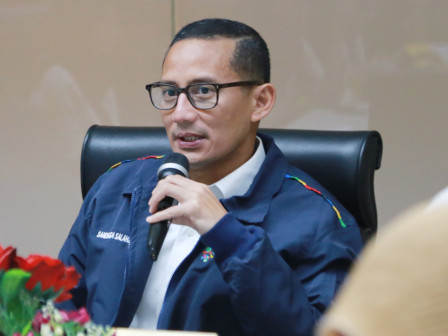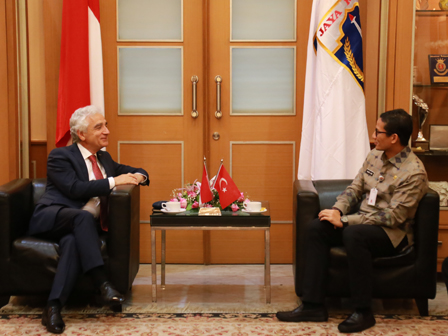Here is Sandi's Kunker Agenda to United States
Reported by Aldi Geri Lumban Tobing | Translated by Nugroho Adibrata
Jakarta Deputy Governor, Sandiaga Uno presented the results of working visit (kunker) to two regions in the United States, Boston and New York City on June 25-30, 2018.
There are 12 meetings, but we're focusing on the four pillars
Kunker was done to discuss and find solutions to a number of problems in Jakarta. "There are 12 meetings, but we're focusing on the four pillars," he said, at City Hall, Monday (7/2).
Sandi Conducts Work Visit to Boston and New YorkThose four pillars were jobs creation in Jakarta, affordable living costs for the people, social and economic justice and education.
He disclosed his visit to the SENSEable City Laboratory at the Massachusets Institute of Technology (MIT). It was a research center that studies and seeks solutions to urban problems using digital technology.
"One of the projects is light traffic, that is a development of traffic technology to reduce the traffic jam due to traffic lights," he disclosed.
He also explained his visit to Global Resilience Center. He met with Professor Stephen Flynn and a team of experts under the Global Resilience Institute (GRI) and discussed how to create a resilient city and find solutions to problems in Jakarta.
"What we discussed here is ranging from jam, flooding, infrastructure failures, cyber attacks up to coastal impacts due to the reclamation of the Jakarta bay," he expressed.
According to him, GRI had conducted research on 'Shoreline Resilience: Predicting Social & Ecological Outcomes of Costal Infrastructure Under Climate Change' in coastal areas of Jakarta with a focus on analyzing the impact of infrastructure development and climate change projects.
"There are some research findings, like prediction analysis of the effects of flooding," he told.
In his visit to Boston, he also met with James Reginald Colimon, Manager of International Partnership, Global Affairs. They discussed about the potential of Jakarta's cooperation with the Boston, either bilateral or multilateral.
Then in his visit to New York City, he met with Marisa Lago, Director of NYC Department of City Planning. They then shared information on the Mandatory Inclusionary Housing (MIH) that needs the construction of residential buildings in certain areas to allocate 20 percent of the total affordable residential units for the lower middle-income people.
As compensation for the policy, the New York City Government granted additional permits to build a 30 percent higher than the initial amount specified in the zoning provisions for developers.
"Jakarta Provincial Government will study whether this program can be adapted in Jakarta in a bid to provide affordable housing for low-income people," he said.
He also visited Smart City New York and Urban Technology Growth Hubs. This visit was a form of collaboration between the two cities in developing the concept of Smart City that can create young entrepreneurs and the provision of employment in Jakarta and New York City.
"New York City facilitates the formation of Urban Technology Growth Hubs, an incubation program for young entrepreneurs to develop technologies that can improve the effectiveness of city system performance," he explained.
Sandi also disclosed the results of his meeting with C40 and 100 Resilient Cities (RC) related to climate change and urban resilience. The meeting with C40 discussed the technical cooperation programs between Jakarta and C40 in the Deadline 2020 program.
"Deadline 2020 is a program designed by several capitals of the world to collaborate on achieving a post-meeting GHG emissions reduction commitment in Paris," he explained.
Lastly, he explained his meeting with 100RC that supported Jakarta in formulating the Jakarta Resilience strategy.
"The city hopes the partnership and cooperation between Jakarta and 100RC will continue and be included in the security program of the city," he hoped.





